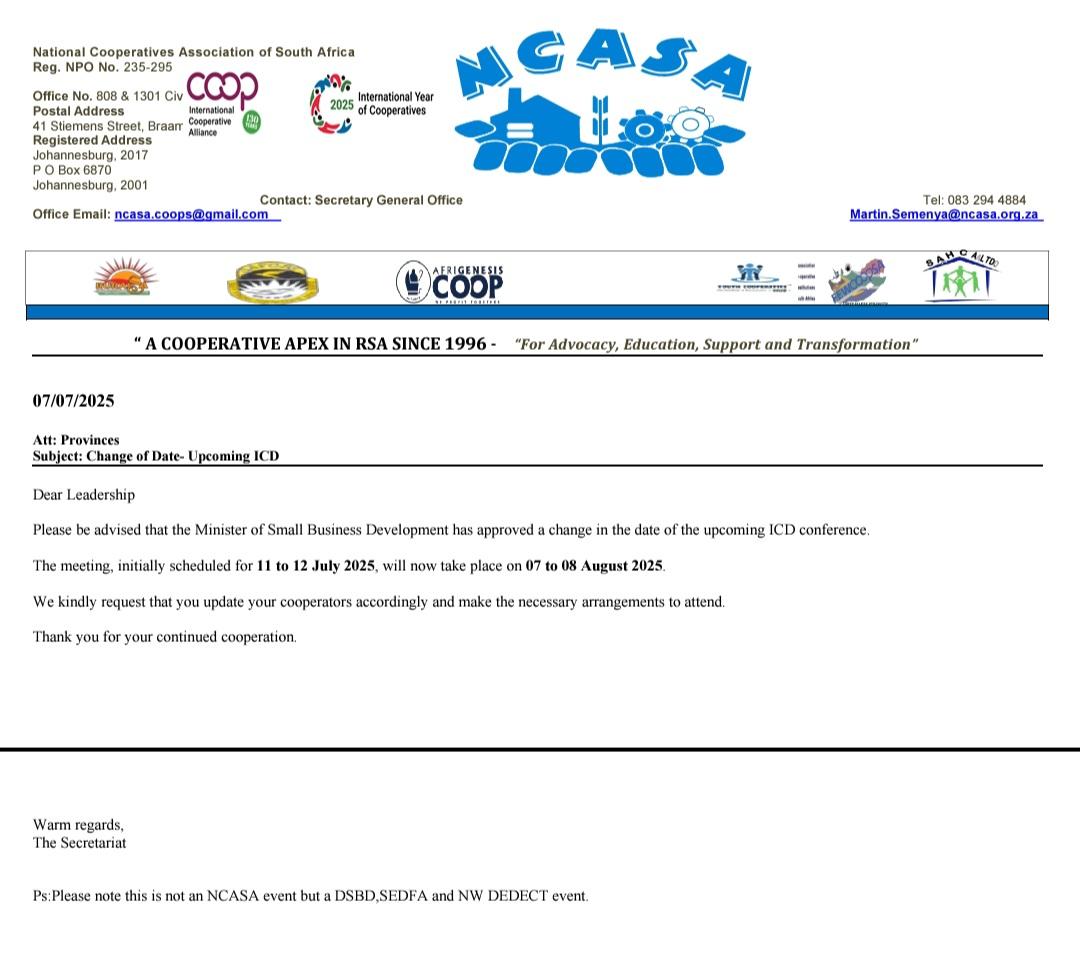NCASA stands as the cornerstone for Co-operatives in South Africa, empowering them to drive economic transformation and foster social development. By uniting diverse Co-operatives under one umbrella, NCASA champions growth, innovation and inclusivity, ensuring that Co-operatives play a pivotal role in building a prosperous and equitable nation.
-
7 Publicações
-
5 fotos
-
Vídeos
-
N/A
-
Seguido por 2 Cooperators
Atualizações Recentes
-
National Cooperatives Association Of South Africaadicionou um arquivo2025-07-19 14:44:19 - Traduzir -General information: Stats SA publishes approximately 300 different statistical releases each year. It is not economically viable to produce them in more than one of South Africa's 12 official languages. Since the releases are used extensively locally and by international economic and social-scientific communities, Stats SA releases are published in English only. Stats SA has copyright on this publication. Users may apply the information as they wish, provided that they acknowledge Stats SA as the source of the basic data wherever they process, apply, utilise, publish or distribute the data; and also that they specify that the relevant application and analysis (where applicable) result from their own processing of the data.General information: Stats SA publishes approximately 300 different statistical releases each year. It is not economically viable to produce them in more than one of South Africa's 12 official languages. Since the releases are used extensively locally and by international economic and social-scientific communities, Stats SA releases are published in English only. Stats SA has copyright on this publication. Users may apply the information as they wish, provided that they acknowledge Stats SA as the source of the basic data wherever they process, apply, utilise, publish or distribute the data; and also that they specify that the relevant application and analysis (where applicable) result from their own processing of the data.Tipo de ficheiro: pdf0 Comentários 0 Compartilhamentos 992 Visualizações 0 AnteriorFaça Login para curtir, compartilhar e comentar!
-
National Cooperatives Association Of South Africaadicionou uma foto2025-07-19 14:42:27 - Traduzir -The Comprehensive Agricultural Support Programme (CASP) is a South African government initiative designed to enhance agricultural development, particularly for smallholder farmers. It provides financial and technical assistance to support various aspects of agricultural production, including infrastructure, training, marketing, and access to information.
Key features of CASP include:
Target Beneficiaries:
CASP focuses on supporting smallholder farmers, land reform beneficiaries, farm workers, and small agribusinesses, including women and youth in agriculture.
Six Pillars of Support:
The program is structured around six key pillars:
On and off-farm infrastructure and production inputs: This includes support for building and improving infrastructure like irrigation systems, storage facilities, and providing essential inputs like seeds and fertilizers.
Targeted training, skills development, and capacity building: CASP provides training programs to enhance farmers' skills in areas like crop production, livestock management, and business management.
Marketing and business development: The program assists farmers in accessing markets for their produce and developing business plans to improve profitability.
Information and knowledge management: CASP provides access to relevant agricultural information and resources, including market information, best practices, and technical advice.
Technical, advisory, and regulatory services: This includes access to expert advice on various agricultural practices, as well as assistance with navigating regulations related to farming.
Financial services: CASP aims to improve access to financial resources for farmers, potentially through partnerships with financial institutions.
Promoting Sustainable Practices:
A key objective of CASP is to promote sustainable agricultural practices that ensure long-term productivity and environmental stewardship.
Improving Food Security:
By supporting increased agricultural production and efficiency, CASP contributes to improved food security for the targeted communities and the nation as a whole.
Provincial Implementation:
The program is implemented by provincial departments of agriculture, working in collaboration with various stakeholders, including the Department of Agriculture, Land Reform and Rural Development (DALRRD).The Comprehensive Agricultural Support Programme (CASP) is a South African government initiative designed to enhance agricultural development, particularly for smallholder farmers. It provides financial and technical assistance to support various aspects of agricultural production, including infrastructure, training, marketing, and access to information. Key features of CASP include: Target Beneficiaries: CASP focuses on supporting smallholder farmers, land reform beneficiaries, farm workers, and small agribusinesses, including women and youth in agriculture. Six Pillars of Support: The program is structured around six key pillars: On and off-farm infrastructure and production inputs: This includes support for building and improving infrastructure like irrigation systems, storage facilities, and providing essential inputs like seeds and fertilizers. Targeted training, skills development, and capacity building: CASP provides training programs to enhance farmers' skills in areas like crop production, livestock management, and business management. Marketing and business development: The program assists farmers in accessing markets for their produce and developing business plans to improve profitability. Information and knowledge management: CASP provides access to relevant agricultural information and resources, including market information, best practices, and technical advice. Technical, advisory, and regulatory services: This includes access to expert advice on various agricultural practices, as well as assistance with navigating regulations related to farming. Financial services: CASP aims to improve access to financial resources for farmers, potentially through partnerships with financial institutions. Promoting Sustainable Practices: A key objective of CASP is to promote sustainable agricultural practices that ensure long-term productivity and environmental stewardship. Improving Food Security: By supporting increased agricultural production and efficiency, CASP contributes to improved food security for the targeted communities and the nation as a whole. Provincial Implementation: The program is implemented by provincial departments of agriculture, working in collaboration with various stakeholders, including the Department of Agriculture, Land Reform and Rural Development (DALRRD).0 Comentários 0 Compartilhamentos 1K Visualizações 0 Anterior -
National Cooperatives Association Of South Africaadicionou um arquivo2025-07-19 14:24:46 - Traduzir -The Comprehensive Agricultural Support Programme (CASP) is a South African government initiative designed to enhance agricultural development, particularly for smallholder farmers. It provides financial and technical assistance to support various aspects of agricultural production, including infrastructure, training, marketing, and access to information.
Key features of CASP include:
Target Beneficiaries:
CASP focuses on supporting smallholder farmers, land reform beneficiaries, farm workers, and small agribusinesses, including women and youth in agriculture.
Six Pillars of Support:
The program is structured around six key pillars:
On and off-farm infrastructure and production inputs: This includes support for building and improving infrastructure like irrigation systems, storage facilities, and providing essential inputs like seeds and fertilizers.
Targeted training, skills development, and capacity building: CASP provides training programs to enhance farmers' skills in areas like crop production, livestock management, and business management.
Marketing and business development: The program assists farmers in accessing markets for their produce and developing business plans to improve profitability.
Information and knowledge management: CASP provides access to relevant agricultural information and resources, including market information, best practices, and technical advice.
Technical, advisory, and regulatory services: This includes access to expert advice on various agricultural practices, as well as assistance with navigating regulations related to farming.
Financial services: CASP aims to improve access to financial resources for farmers, potentially through partnerships with financial institutions.
Promoting Sustainable Practices:
A key objective of CASP is to promote sustainable agricultural practices that ensure long-term productivity and environmental stewardship.
Improving Food Security:
By supporting increased agricultural production and efficiency, CASP contributes to improved food security for the targeted communities and the nation as a whole.
Provincial Implementation:
The program is implemented by provincial departments of agriculture, working in collaboration with various stakeholders, including the Department of Agriculture, Land Reform and Rural Development (DALRRD).The Comprehensive Agricultural Support Programme (CASP) is a South African government initiative designed to enhance agricultural development, particularly for smallholder farmers. It provides financial and technical assistance to support various aspects of agricultural production, including infrastructure, training, marketing, and access to information. Key features of CASP include: Target Beneficiaries: CASP focuses on supporting smallholder farmers, land reform beneficiaries, farm workers, and small agribusinesses, including women and youth in agriculture. Six Pillars of Support: The program is structured around six key pillars: On and off-farm infrastructure and production inputs: This includes support for building and improving infrastructure like irrigation systems, storage facilities, and providing essential inputs like seeds and fertilizers. Targeted training, skills development, and capacity building: CASP provides training programs to enhance farmers' skills in areas like crop production, livestock management, and business management. Marketing and business development: The program assists farmers in accessing markets for their produce and developing business plans to improve profitability. Information and knowledge management: CASP provides access to relevant agricultural information and resources, including market information, best practices, and technical advice. Technical, advisory, and regulatory services: This includes access to expert advice on various agricultural practices, as well as assistance with navigating regulations related to farming. Financial services: CASP aims to improve access to financial resources for farmers, potentially through partnerships with financial institutions. Promoting Sustainable Practices: A key objective of CASP is to promote sustainable agricultural practices that ensure long-term productivity and environmental stewardship. Improving Food Security: By supporting increased agricultural production and efficiency, CASP contributes to improved food security for the targeted communities and the nation as a whole. Provincial Implementation: The program is implemented by provincial departments of agriculture, working in collaboration with various stakeholders, including the Department of Agriculture, Land Reform and Rural Development (DALRRD).Tipo de ficheiro: pdf0 Comentários 0 Compartilhamentos 1K Visualizações 0 Anterior -
National Cooperatives Association Of South Africaadicionou uma foto2025-07-18 14:40:57 - Traduzir -0 Comentários 0 Compartilhamentos 561 Visualizações 0 Anterior
-
National Cooperatives Association Of South Africaadicionou uma foto2025-07-18 14:40:00 - Traduzir -0 Comentários 0 Compartilhamentos 557 Visualizações 0 Anterior
-
National Cooperatives Association Of South Africaatualizou a foto de capa2025-07-18 14:37:49 - Traduzir -0 Comentários 0 Compartilhamentos 544 Visualizações 0 Anterior
-
National Cooperatives Association Of South Africaatualizou a foto de perfil2025-07-18 13:55:51 - Traduzir -0 Comentários 0 Compartilhamentos 534 Visualizações 0 Anterior
Mais Stories













